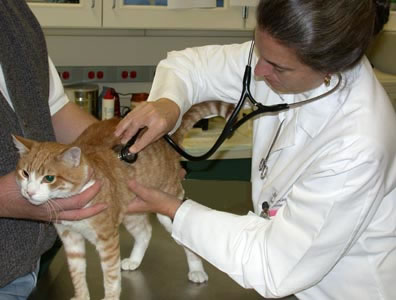 The University of Missouri Veterinary Health Center is pleased to offer minimally invasive procedures to treat blockages, shunts, some tumors and tracheal collapse.
The University of Missouri Veterinary Health Center is pleased to offer minimally invasive procedures to treat blockages, shunts, some tumors and tracheal collapse.
Who can be helped?
These new interventional procedures have the potential to help dogs and cats with chronic degenerative and neoplastic conditions that previously could only be helped with medical management such as drugs or by limiting activity.
Using intraluminal stents, which function like tiny springs, MU veterinarians can open narrowed areas, such as a collapsed trachea, to improve breathing or offer relief from blockages caused by prostatic and bladder tumors, chronic kidney stones or colonic obstructions.
Minimally invasive procedures can also be used to close vascular anomalies including patent ductus arteriosus (PDA), intrahepatic portosystemic shunts, and peripheral arteriovenous fistulae and venous malformations. PDA, one of the most common congenital heart defects in dogs, involves the ductus arteriosus, a blood vessel that normally closes shortly after birth. When it fails to close, it can lead to congestive heart failure within a year. Intrahepatic portosystemic shunts are abnormal blood vessels in the liver. Peripheral arteriovenous fistulae and venous malformations are abnormal vascular connections that can cause localized swelling, skin discoloration, ulceration and, in some cases, heart failure.
Previously, repair of these defects required major surgery. These procedures are performed with minimal incisions, or in some cases none at all.
We now offer the following procedures:
- Laser correction of ectopic ureters
- Pacemaker implantation
- Balloon valvuloplasty
- Subcutaneous ureteral bypass device implantation
- Tracheal stenting
- Urethral stenting
- Ureteral stenting
- Intrahepatic portosystemic shunt occlusion
- Patent ductus arteriosus occlusion
- Temporary nephrostomy drainage catheters for renal obstruction with pyelonephritis
These treatments primarily offer palliative care to sick animals. However, in some instances they open the door for additional treatment options. For example, dogs with prostatic cancer may not be suitable for enrollment in cancer treatment trials if they cannot urinate; placing a stent to relieve that obstruction would make them eligible for these trials.
For more information, call 573-882-7821.



